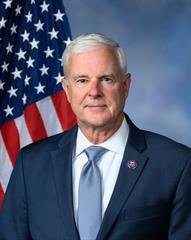Bruce Westerman
Steve Womack
WASHINGTON - Reps. Bruce Westerman (R-AR-04), Jared Huffman (D-CA-02), and Steve Womack (R-AR-03), introduced H.R. 6906, the Lake Access Keeping Economies Strong (LAKES) Act to expand opportunities to improve and develop outdoor recreation facilities at U.S. Army Corps of Engineers (USACE) managed areas.
“Outdoor recreation is among one of the top economic drivers in the U.S., especially in states like Arkansas. Because of discrepancies in current federal law, managers of some of our favorite outdoor recreation sites have to jump through bureaucratic hoops to maintain and manage the sites. The LAKES Act will correct the discrepancies, cut out the burdensome federal red tape, and make it easier for the Corps to manage their sites for generations to enjoy for years to come,” Rep. Westerman said.
“Outdoor recreation is a fundamental part of life for folks in my district, and its popularity – and the demand for increased access – is growing nationwide. Local favorites for my constituents, like Lake Sonoma and Lake Mendocino, provide all kinds of opportunities for outdoor fun. But local managers have to jump through countless hoops to keep these places safe and enjoyable,” said Rep. Huffman. “Our bill will guarantee the Army Corps can retain recreation fees at the sites they’re collected and it will open doors for management partnerships with tribes and local organizations so we can all care for the country’s treasured public spaces.”
“Arkansas’ Third is home to world-class outdoor offerings, attracting tourists and residents alike to enjoy the immense beauty and participate in our endless recreational activities. However, under current federal law, local managers of recreation sites we all know and love, such as Beaver Lake and Table Rock Lake, must cut through endless bureaucratic red tape to maintain and operate these sites effectively,” said Rep. Womack. “The LAKES Act would rectify this by allowing the Army Corps to retain recreation fees collected onsite, keeping maintenance and operations decisions out of the hands of federal bureaucrats and into the hands of the local managers who know these sites best.”
Stakeholder support:
“Thank you to Rep. Bruce Westerman (R-AR), Rep. Steve Womack (R-AR), and Rep. Jared Huffman (D-CA) for championing the introduction of The Lake Access Keeping Economies Strong (LAKES) Act,” said Frank Hugelmeyer, President and CEO of the National Marine Manufacturers Association (NMMA). “This legislation prioritizes the maintenance and upkeep of high-use recreation infrastructure and facilities enjoyed by millions of Americans. By providing the Army Corps of Engineers with the ability to reinvest recreation fees into the operations and maintenance of recreation access points, the LAKES Act helps support the outdoor recreation economy, which contributes more than $1 trillion to our country’s economy and represents a significant pastime for millions of Americans.”
Background:
Under current law, U.S. Army Corps of Engineers (USACE) recreation facilities cannot retain recreation fee revenues collected onsite, an authority afforded to the U.S. Forest Service, Bureau of Land Management, and National Park Service.
The Challenge Cost Sharing Cooperative Management Program was created for participating agencies to split operation and management expenses with outside groups. However, despite interest from private and nonprofit organizations, USACE is limited to partnering with non-federal public entities.
The USACE is one of the nation’s largest federal outdoor recreation providers, managing nearly 257,000 facilities across 43 states.
U.S. Senators Kevin Cramer (R-ND), Martin Heinrich (D-NM), Alex Padilla (D-CA), John Boozman (R-AR), Jon Tester (D-MT), and Steve Daines (R-MT) are cosponsors of the Senate companion LAKES Act.
The LAKES Act would:
Allow USACE to retain 80% of recreation fees collected onsite for operation and management expenses at that location.
Amend the Challenge Cost Sharing Cooperative Management Agreement authority to enable nonprofit entities to enter into cooperative agreements to operate and maintain recreation facilities under USACE jurisdiction.
Keep resources and decision-making related to the operation and maintenance of recreation facilities under USACE jurisdiction in the hands of local managers rather than federal officials.
Click here to view the full bill text.
Click here to view a letter of support from over 25 organizations representing various sections of the U.S. outdoor recreation industry.






















